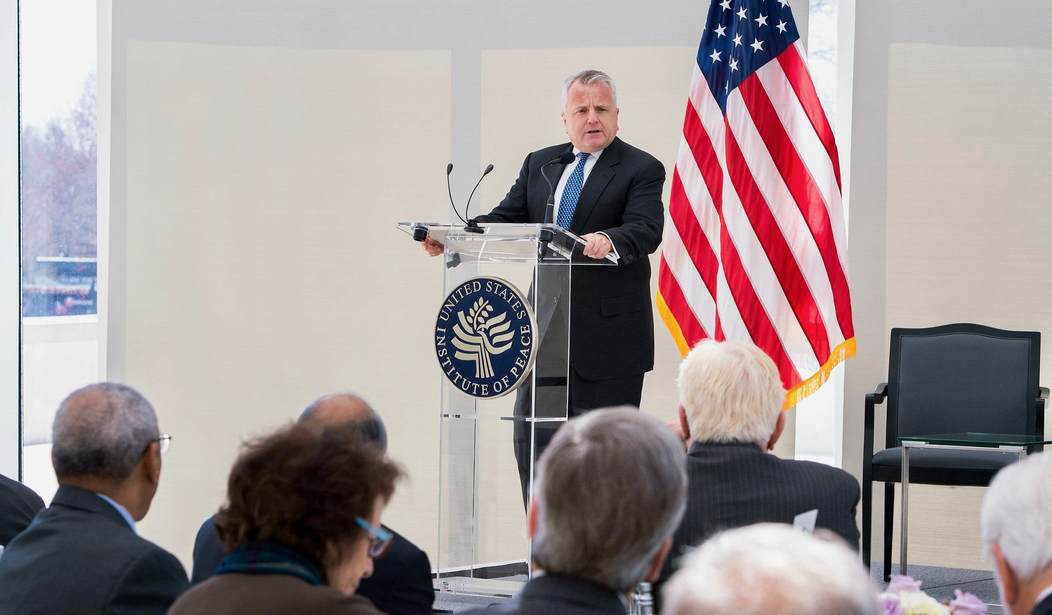WASHINGTON — Deputy Secretary of State John Sullivan cautioned that as the physical caliphate has mostly gone down in Iraq and Syria, ISIS has fanned out to other countries.
Speaking at the U.S. Institute of Peace on Thursday, Sullivan noted that “great progress” has been made militarily “at rooting out ISIS, and today 4.5 million Iraqis have been freed from that tyranny,” but “2.5 million internally displaced persons are still seeking to return to their homes.”
“Effective reconstruction is critical to ensuring ISIS can never return, and we are committed to working with our partners in the region to help the government in Iraq rebuild,” he said. “Since 2014, the United States has provided more than $1.7 billion in humanitarian assistance for Iraq, and we continue to provide support to promote a safe, voluntary, and dignified return of Iraqis still displaced by the conflict. This assistance also supports the rehabilitation of schools, legal aid to restore housing and property rights, and help millions of Iraqis re-establish their livelihoods.”
In Syria, the U.S. has provided nearly $7.7 billion in humanitarian assistance since the beginning of conflict there.
Sullivan, who is filling in as secretary of State until Rex Tillerson’s replacement is confirmed by the Senate, said he was in Abuja, Nigeria, a few months ago, and saw “the challenges are enormous” with the threat from Boko Haram and ISIS West Africa. “Particularly in northwestern Nigeria, is very serious, as we’ve seen just in the last few weeks with the kidnapping of another 110 schoolgirls, most of whom have been released, but only on the condition that they not be allowed to go back to school, which is astounding on its face,” he said. “But we’re thankful that at least most of those young girls have been released, but we’ve got to address the security situation.”
The U.S. and partner nations are dealing with not just the security threat posed by terror groups, he said, “but the actual manifestation of the carnage inflicted by organizations like ISIS and al-Qaida in Syria, Iraq, Libya, you name it.”
“This conflict with these terror organizations actually started before September 11th, but for most of us in our consciousness was really crystallized on September 11th. But that conflict has continued for the last 17 years, and I don’t know that we see an end in sight,” he added.
“We may have defeated the so-called caliphate, removed almost all of their territorial ambitions in Iraq and in Syria, but they’ve dispersed. They’ve moved to other countries. There are still pockets of ISIS left in Syria, particularly in eastern Syria, that are — remain a threat. Our mission in Syria, in northern Syria, remains the complete eradication of ISIS. But as we move down — just using Syria as an example, as the U.S. military moves down the Euphrates River Valley, supporting — providing support to our partner forces in the [Syrian Democratic Forces] — when we liberate — when we remove ISIS from those areas, there’s an enormous need for assistance for just stabilization, demining, removing all of the booby traps, mines, and so forth that ISIS has left behind in places like Raqqa and elsewhere in Syria and Mosul in Iraq.”
Sullivan clarified that beginning the resumption of basic services like water and electricity is “not really talking about nation-building.”
“We’re talking about the resumption of basic stabilization operations so that people can return to their homes, be safe — removing rubble from streets; for buildings that have been damaged and are dangerous to return to, knocking them down and clearing away dangerous obstacles; demining as I mentioned — that type of — those types of assistance and stability operations is something that’s very necessary for us to provide,” he continued. “As soon as our military moves out, we’re looking to move in USAID, State Department, other U.S. Government entities to provide that type of stabilization assistance so that refugees can return to their homes as soon as possible, not before they’re ready to but when they’re ready to.
Sullivan stressed that “we don’t want to force people back into situations that are still dangerous.”
“Refugees should return home when it’s safe for them to do so. And it’s incumbent upon us and partner countries and nations and organizations to do all we can to repair that damage that’s been done, once our military and partner forces have eliminated the security threat,” he said.
“So it’s a huge challenge for us, just in Iraq and Syria — enormous challenge. Number of internally displaced persons is in the millions in Iraq and in Syria.”









Join the conversation as a VIP Member